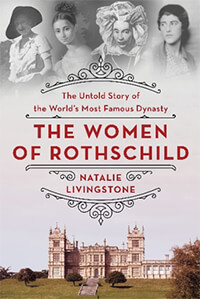 Book Review by Myra Salzer
Book Review by Myra Salzer
This relatively thick book caught my attention because, in my experience, nobody ever looked at the Rothschild dynasty from the women’s perspective. Mayer Amschel Rothchild (1744-1812), commonly referred to as the founder of the dynasty, could not have accomplished what he did without his wife, Gutle Schnapper (1753-1849). Together they had 10 children, four boys and six girls. Mayer Amschel set the tone of the dynasty in his will, where he stated that only male offspring could inherit assets and/or run the bank. Also, he was very clear that those who married into the family would not be allowed to own family assets.
The book focuses on the lives of 17 Rothchild women, some of whom were genetically related to Mayer Amschel and Gutle, and some of whom had married into the family. All were interesting people, blazing new paths for themselves and for society. The timespan covered in the book starts with Gutle and ends with Rosie (Rozsika Mary) Lane (1945-2010). And while this short book review will not get into each of the interesting women and their lives, I will mention that they were trailblazers in many different realms, including Zionism and establishment of Israel, science, arts, women’s suffrage, and the white abolitionist movement.
I learned much about European Jewry over the centuries. In fact, the only reason Mayer Amschel was able to start in banking was because in the early 1800s, Christians were still not allowed to charge interest, so it was left to the Jews to become bankers. I had no idea that Frankfurt, Germany was where it all began before branching out throughout mostly Europe. A branch of the family became nobles and politicians in England. There were also entertainers, philanthropists, scientists, entrepreneurs, writers, and let’s not forget – bankers – among them.
Embarrassingly, I was unfamiliar with the breadth of anti-Semitism that existed for hundreds of years. I didn’t know about the pogroms in Russia or the magnitude of theft and destruction of Jews way before the Holocaust. Advances in medical care, now taken for granted, would have profoundly impacted the family, many of whom married their cousins, uncles, and other relatives. Mental health issues were rampant and several of the women died in childbirth, or the baby didn’t survive childbirth. All of those things might have been non-issues in 2022.
People often asked me to pigeonhole inheritors, and I haven’t been able to do so because there is no “typical” inheritor of wealth. They aren’t all philanthropists, they aren’t all happy or dramatic or ne’er-do-wells or egotistical, self-absorbed, socially awkward, selfish individuals. The same holds true for the Rothschild heirs.